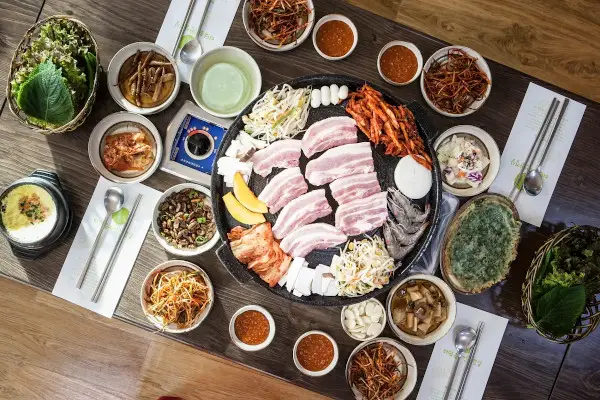When it comes to mouthwatering grilled fare, Japanese and Korean BBQs have a lot to offer. But have you ever wondered what sets them apart? The secret lies in their tantalizing sauces, which boast unique flavors that can elevate any dish.
In this blog post, we’ll dive into the delicious world of Japanese vs Korean barbecue sauce by exploring its history, ingredients, regional variations, and popular dishes.
Key Takeaways
- Japanese and Korean BBQ sauces have distinct flavor profiles, with Japanese sauce featuring umami-rich elements like mirin and sake, while Korean sauces tend to be spicy and savory with gochujang as a staple ingredient.
- The usage and cooking methods of these sauces also differ; in Japanese BBQ, diners typically grill bite-sized pieces of meat over a flame before dipping or glazing them with the sauce. In contrast, Korean BBQ heavily emphasizes marinating meats before grilling them for maximum flavor penetration.
- Popular dishes that utilize these sauces include Yakitori chicken served with Yakitori sauce for Japanese barbecue and Bulgogi beef bowls using Bulgogi sauce or Galbi short ribs with Galbi sauce for Korean BBQ.
Overall, experimenting with different combinations of these versatile Asian sauces can elevate any grilled dish to new heights!
Overview Of Japanese Vs Korean BBQ Sauces
Are you a fan of Asian cuisine? Have you ever tried Korean and Japanese BBQ sauces? These two sauces are unique and very different from each other, making them perfect for experimenting with your taste buds. Japanese and Korean BBQ sauces are flavorful, and packed with exciting ingredients that elevate your meal to the next level. Both cultures have their own take on grilling meat and offer an enjoyable dining experience for people of all ages. In this blog post, we will compare and contrast Japanese Vs Korean BBQ sauce; we’ll explore the history behind these mouthwatering recipes, their key ingredients, usage, cooking methods, regional variations, and popular dishes recipe recommendations. Let’s dig in!
History And Origins
The rich history and origins of Japanese and Korean BBQ sauces reflect the unique culinary traditions of both countries.
In Japan, the origins of Yakiniku-style BBQ can be traced back to the post-World War II era, although some believe it was inspired by earlier Korean immigrants residing in Japan.
Japanese BBQ sauce plays a vital role in imparting flavor to grilled dishes.
Korean cuisine has focused on the barbecue for centuries, with ancestral tribes mastering techniques such as roasting meats over open flames or cooking them on ceramic stovetops known as “Jeong Sik”.
The unique flavors found in Korean BBQ sauces stem from an emphasis on marinades instead of dipping sauces like their Japanese counterparts.
Overall, both Japanese and Korean BBQ sauces share similarities due to geographic proximity but ultimately showcase distinctive taste profiles that highlight the differences between each country’s approach to barbecuing meat and vegetables.
Key Ingredients And Flavors
Japanese and Korean BBQ sauces share some commonalities in ingredients, such as soy sauce, garlic, and sugar. However, each cuisine features unique flavors that define their respective sauces.
Japanese BBQ sauce typically incorporates umami-rich elements like mirin (sweet rice wine), sake (Japanese rice wine), ginger, and sesame oil to create a balanced yet bold taste profile.
On the other hand, Korean BBQ sauces are well-known for their spicy and savory flavors. Gochujang (fermented red chili paste) is a staple ingredient in many Korean dishes including galbi sauce that imparts a distinct sweet heat when combined with soy sauce, sugar or honey, garlic, and ginger.
Other popular ingredients that can be found in various Korean BBQ recipes are doenjang (Korean fermented soybean paste), pear puree, or grated Asian pear for natural sweetness while tenderizing meat simultaneously as well as fragrant sesame oil used mainly for dipping purposes to enhance flavors further without overpowering them.
Differences Between Japanese And Korean BBQ Sauces
Japanese and Korean BBQ sauces have distinct differences in their usage, cooking methods, and regional variations.
Usage And Cooking Methods
One of the primary distinctions between Japanese and Korean BBQ sauces lies in their usage and cooking methods. In Japanese BBQ, also known as Yakiniku, diners typically grill bite-sized pieces of meat (such as beef or chicken) over a charcoal or gas flame at the table.
Before grilling, meats are seasoned with salt and pepper, while sauces like Yakitori, Teriyaki, and Tare take center stage after cooking for dipping or glazing purposes.
On the other hand, Korean BBQ heavily emphasizes marinating meats before they hit the grill. Dishes such as Bulgogi and Galbi feature thin slices of meat drenched in a delicious blend of soy sauce, sugar, garlic, and sesame oil – sometimes complemented by spicy Gochujang sauce – allowing flavors to fully penetrate the cuts before being cooked over charcoal or gas fire.
Regional Variations
Japanese and Korean BBQ sauces have noticeable regional variations that distinguish the two cuisines. Japanese BBQ sauce, also known as tare, is a thick and sweet sauce that adds flavor to various grilled meats such as beef, chicken, pork, and seafood.
In contrast to Japanese BBQ sauces’ thick consistency that tends to stick well on meat dishes during grilling or broiling processes; Korean BBQ marinades are usually watery in texture consisting of ingredients like pear puree along with soy sauce flavored with gochugaru (red chili flakes), brown sugar or honey for sweetness.
The marinade process involves soaking thinly sliced cuts of beef short ribs called galbi and bulgogi in this mixture before grilling them over charcoal flames at high temperatures.
Japanese BBQ Sauces
Yakitori sauce is a staple in Japanese BBQ and features a combination of soy sauce, sake, mirin, sugar, and garlic.
Yakitori Sauce: Ingredients, Flavor Profile, And Popular Dishes
Yakitori sauce is a traditional Japanese condiment that perfectly complements grilled chicken skewers. The sauce has a sweet, savory, and smoky flavor profile due to the combination of Japanese rice wine (mirin), scallions, ginger, sugar, soy sauce, sake, and spices.
Yakitori sauce is similar in taste to teriyaki sauce- another popular Japanese condiment with a sweet and savory profile. Yakitori chicken is one of Japan’s most beloved dishes; it involves skewered grilled chicken served with yakitori sauce as an essential component.
Teriyaki Sauce: Ingredients, Flavor Profile, And Popular Dishes
Teriyaki sauce is a popular Japanese BBQ sauce that has become increasingly mainstream worldwide. To make the traditional version of teriyaki sauce, you will need soy sauce, mirin, sake or white wine, and sugar.
The result is a sweet and salty glaze that can be used on various types of meat like chicken, beef, or salmon to add an excellent umami flavor.
One popular dish that uses teriyaki sauce is Teriyaki Chicken – which consists of grilled chicken pieces with a sticky coating of teriyaki glaze over them. Other dishes that utilize this Japanese BBQ staple are meat skewers (Yakitori) and seafood dishes like grilled squid (Ika Yaki).
Tare Sauce: Ingredients, Flavor Profile, And Popular Dishes
Tare sauce is a thick, savory, and sweet Japanese BBQ sauce that’s typically made with soy sauce, sake or mirin, sugar or honey, and optional ingredients like oyster sauce and ginger.
This multi-purpose condiment has a delicious umami flavor with hints of salty and sweet notes. Tare sauce works great as a marinade for meats like beef or chicken before grilling them to perfection, but it can also be used as a dipping sauce for veggies or seafood.
Popular dishes that use tare include Yakiniku Don (grilled meat served over rice), Negima Yakitori (grilled chicken skewers with scallions), and Gyu Donburi (beef bowl).
Korean BBQ Sauces

Korean BBQ sauces are known for their bold flavor profiles and versatility in cooking, with popular options including bulgogi sauce, galbi sauce, and gochujang sauce.
Bulgogi Sauce: Ingredients, Flavor Profile, And Popular Dishes
Bulgogi sauce is a popular Korean BBQ sauce that has a sweet and smoky flavor profile. Made with a mixture of soy sauce, sugar, ginger, garlic, and sesame oil, this savory marinade is perfect for tenderizing the meat while adding an intense umami flavor to it.
Bulgogi is usually used as a marinade for thinly sliced beef or pork before grilling over charcoal or gas stoves.
If you’re looking to add some variety to your next BBQ party or a home-cooked meal, try using bulgogi sauce in place of traditional barbecue sauces.
Galbi Sauce: Ingredients, Flavor Profile, And Popular Dishes
Galbi sauce is a popular Korean BBQ sauce that’s made with soy sauce, sugar, water, mirin, and onions. The marinade is typically used on beef short ribs to add a sweet and savory flavor to the meat.
Galbi can also be used for pork dishes as well. The sauce has a slightly thick consistency which helps it cling to the meat nicely.
The flavor profile of galbi sauce can be described as sweet and salty with hints of garlic and onion flavors in the background. It pairs perfectly with grilled meats like beef short ribs or pork belly but can also be used as a dipping sauce for other meats or vegetables.
Some popular dishes that use galbi are bulgogi tacos, bibimbap rice bowls, or skewered grilled chicken marinated in galbi sauce.
Gochujang Sauce: Ingredients, Flavor Profile, And Popular Dishes
Gochujang sauce is a staple condiment in Korean cooking. Made from red chili pepper flakes, fermented soybeans, sticky rice, and salt, gochujang sauce has a distinct spicy, salty, and slightly sweet flavor profile.
In addition to its traditional use in Korean cuisine, gochujang sauce has also become popular outside of Korea. Restaurants and food vendors have incorporated the sauce into various dishes such as burgers, tacos, and wings to add a bold kick of flavor.
Its versatility allows it to be paired with different meats and vegetables for a unique taste experience.
Using Japanese And Korean BBQ Sauces In Your Cooking
Marinade your meat in Japanese BBQ sauces like Yakitori Sauce, Teriyaki Sauce, or Tare Sauce for a sweet and savory flavor, or use Korean BBQ sauces such as Bulgogi Sauce, Galbi Sauce, or Gochujang Sauce to add bold and spicy flavors to your dishes.
Marinade: Tips On How To Prepare And Use
To maximize the flavor of your Japanese and Korean BBQ dishes, marinating your meats in these delicious sauces is a must. Here are some tips on how to prepare and use marinades:
- Choose the right cut of meat: Look for meats with some fat content, such as chicken thighs or pork belly, which will absorb more flavors from the marinade.
- Prepare the marinade: Combine your chosen sauce with other ingredients like garlic, ginger, sesame oil, and soy sauce to create a flavorful marinade.
- Marinate time: The longer you marinate the meat in the sauce, the more flavor it will absorb. Aim for at least 30 minutes to an hour but marinating overnight can also be done.
- Proper storage: Place the marinated meat in a sealed bag or container and store it in the refrigerator until ready to cook.
- Use excess sauce: If you have leftover marinade after soaking your meats, boil it for a few minutes to kill bacteria before using it as a dipping sauce or glaze.
- Don’t over-marinate: Over-marinating can make the meat taste too salty or even mushy. Be sure to follow recommended marinating times or adjust according to the size of your meat cuts.
By following these simple tips, you can take your Japanese and Korean BBQ dishes to another level with flavorful and tender meats that will leave everyone craving for more!
Dipping Sauce: Recommended Pairings With Different Meats And Vegetables
When it comes to Japanese and Korean BBQ sauces, the dipping sauce plays a crucial role in enhancing the flavors of different meats and vegetables. Here are some recommended pairings to try:
- Japanese Yakitori Sauce: pairs well with chicken skewers, pork belly, and shiitake mushrooms.
- Japanese Tare Sauce: goes well with beef skewers, lamb chops, and grilled eggplant.
- Japanese Teriyaki Sauce: perfect for glazed salmon, beef ribs, and grilled pineapple.
- Korean Bulgogi Sauce: ideal for marinated beef bulgogi, pork belly slices, and grilled onions.
- Korean Galbi Sauce: great for short ribs, brisket slices, and ribeye steak.
- Korean Gochujang Sauce: pairs well with spicy grilled chicken thighs, tofu slices, and roasted sweet potatoes.
Remember that these recommendations are just a starting point! You can mix and match different sauces with your favorite meats and vegetables to discover your own unique flavor combinations.
Glaze: Best Ways To Apply And Cook With
When it comes to using Japanese and Korean BBQ sauces, glazing is a great way to add flavor and complexity to your dishes. Here are the best ways to apply and cook with these delicious sauces:
- Brush the sauce onto the meat: Use a pastry brush or a basting brush to coat your meat with the sauce before cooking. This will help seal in the flavors and create a tasty caramelized crust.
- Add the sauce towards the end of cooking: If you’re grilling or roasting meats, wait until they’re almost done before brushing on the sauce. This will prevent burning and ensure that your meat is juicy and flavorful.
- Double up on the glaze: For an extra layer of flavor, brush on another layer of glaze halfway through cooking. This will help intensify the flavors and create a delicious sticky coating.
- Experiment with different types of glazes: Try mixing different Japanese or Korean sauces together for unique flavor combinations. You can also add other ingredients like honey, soy sauce, or garlic for added depth.
- Consider using a broiler: If you want a crispy finish, try putting your glazed meat under the broiler for a few minutes after cooking. This will create a delicious charred exterior while keeping your meat tender and juicy.
By following these tips, you’ll be able to create mouth-watering dishes that showcase the delicious flavors of Japanese and Korean BBQ sauces. Don’t be afraid to experiment and find your favorite combinations!
Recommended Recipes To Try
If you’re looking to try out some new recipes using Japanese and Korean BBQ sauces, here are a few ideas to get started:
- Japanese Yakitori Chicken Skewers: Marinate chicken pieces in a mixture of soy sauce, sake, mirin, garlic, ginger, and brown sugar before grilling and basting with a traditional yakitori sauce.
- Korean Beef Bulgogi Bowls: Mix thinly sliced beef with a marinade of soy sauce, sesame oil, garlic, sugar, and pear juice before cooking and serving over rice with veggies and a drizzle of bulgogi sauce.
- Japanese Teriyaki Glazed Salmon: Brush salmon fillets with a mixture of soy sauce, sake, mirin, honey, garlic, and ginger before baking or broiling until tender and flaky.
- Korean Pork Belly Tacos: Marinate thinly sliced pork belly in gochujang sauce before pan-frying until crispy and serving on warm tortillas with pickled veggies and cilantro.
- Japanese Tare Glazed Eggplant: Slice eggplant into thick rounds and brush with tare sauce made from soy sauce, mirin, sake, sugar, and garlic powder before grilling or roasting until caramelized and tender.
Remember that both Japanese and Korean BBQ sauces can be used as marinades for meat or tofu dishes or as dipping sauces for grilled veggies or seafood. Play around with different combinations to find the ones you love!
Conclusion And Final Thoughts
In conclusion, Japanese and Korean BBQ sauces may appear similar at first glance due to their Asian origins, but they have subtle differences that set them apart. While both cuisines utilize grilled meats in their dishes, the focus on taste and the kinds of sauces used can vary greatly.
Japanese BBQ dishes tend to emphasize the natural flavors of beef and chicken with dipping sauces like garlic, mirin, and soy sauce. Meanwhile, Korean BBQ is seasoned with a marinade that contains ingredients like garlic, ginger, sesame oil, brown sugar, or honey.




Leave a Reply